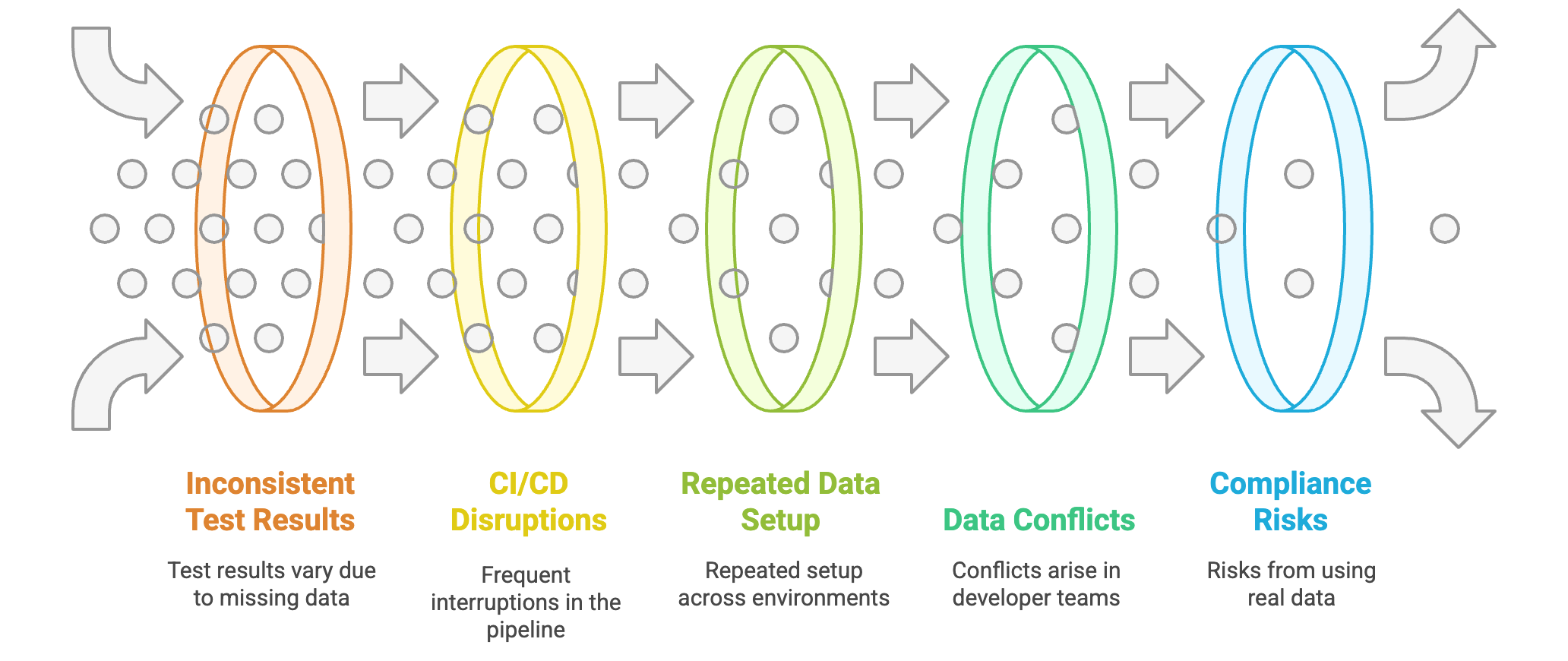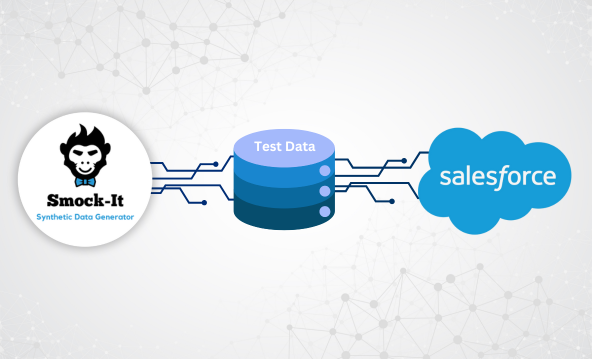Smock-it GitHub Actions: Instant Salesforce Mock Data for CI/CD!
Why Smock-it GitHub Action for Salesforce Mock Data? 🤔
Reliable Salesforce testing demands consistent, structured, and scalable mock data. Manual methods often fail due to:
Missing test records, causing inconsistent test results.
Unavailable test data cause frequent CI/CD pipeline disruptions.
Repeated manual data setups across sandboxes or scratch orgs.
Data conflicts in collaborative developer teams.
Difficulty managing complex Salesforce relationships (Accounts, Opportunities, Cases).
Compliance risks associated with using real customer data.
Smock-it’s GitHub Action addresses these pain points by automating test data generation directly within your Salesforce CI/CD workflows.
Benefits of Smock-it in Salesforce CI/CD
⚙️ Fully Automated: Trigger test data generation directly from GitHub Actions.
🔄 CI/CD Friendly: Seamlessly integrates with GitHub Actions for automatic data generation before test execution
🌐 Universal Org Compatibility: Works with scratch orgs, sandboxes, UAT, and staging.
📈 Customizable & Scalable: Templates tailor data to your precise business requirements.
👩💻 Rapid Developer Onboarding: Instantly provision configured environments for new team members.
🔐 Compliance Assured: Synthetic test data eliminates privacy concerns, adhering strictly to GDPR and similar regulations.
Comparison: Smock-it vs. Manual Salesforce Mock Data Creation 🔍
| Feature | Manual Creation ❌ | Smock-it GitHub Action ✅ |
|---|---|---|
| 🚀 Speed | Slow (hours of effort) | Instant (minutes) |
| ⚡️ Consistency | Variable per environment | Fully consistent & repeatable |
| 📌 CI/CD Integration | Not integrated | Easy integration into GitHub Actions |
| 👥 Team Collaboration | Frequent data conflicts | Standardized & reusable datasets |
| 📊 Structured Data | Difficult to maintain | Easily supports complex models |
| 🔒 Compliance | Risky – possible exposure of PII | Secure synthetic data generation |
Complete Setup Guide for Smock-it GitHub Action 🛠
Prerequisites:
Node.js v18+
Salesforce CLI
Org authorization is completed with an alias (JWT Auth details)
Mockaroo API Key: Sign up here for a FREE account.
Repository Structure:
Rulesets (template files) are present for data generation.
Store templates:
data_gen/templates/Generated data outputs:
data_gen/output/
Integration Steps
#1 With Existing WorkFlow
Ensure you have all prerequisites in your existing GitHub Workflow and Repository.
Add a new secret to your repository, MOCKAROO_API_KEY, and pass the generated API Key on as a value.
Navigate to your repository on GitHub.
Go to "Settings" > "Secrets and variables" > "Actions" > "Secrets".
Click "New repository secret".
Enter a name for your secret i.e.
MOCKAROO_API_KEYPaste the API key or sensitive value into the "Value" field.
Click "Add secret".
Pass other required parameters(templates, org-alias) per your workflow configurations.
Add the below step to your existing workflow after all prerequisite steps.
- name: generate data using smock-it
uses: concretios/smock-it@main
with:
templates: ${{ inputs.templates }}
org-alias: ${{ inputs.org-alias }}
mockaroo-api-key: ${{ secrets.MOCKAROO_API_KEY }}Step Parameters:
templates: In case of a different Event than workflow_dispatch, one can hardcode the template names in string.
e.g.
accountCreate.json,leadCreate.json,closedWonOpp.json, etc.
org-alias: You can extract the value of alias from the previous step(org authorization) and add it here; otherwise, you can always have a static hardcoded value of alias, which should be the same as you passed in the previous step.
You can also add a new step(if it does not exist already) to upload the artifacts of data_gen/output/ directory to get the generated output of smock-it data.
- name: upload artifacts
uses: actions/upload-artifact@v4
with:
name: SmockItOutputFiles
path: data_gen/output/
retention-days: 15 #(max. 90 days)
if-no-files-found: warn #(warn, error, ignore)#2 With New WorkFlows
Follow all the prerequisites.
Add the below workflow to your repository.
name: Smock-it - Salesforce Test Data Generation
on:
workflow_dispatch:
inputs:
templates:
description: "Provide comma-separated templates name (e.g lead_creation.json, account_creation.json)"
required: true
type: string
org-alias:
description: "Provide alias for authorizing salesforce org"
required: true
type: string
default: "smockit"
jobs:
generate-test-data:
runs-on: ubuntu-latest # You can add choice of your runner
steps:
- name: checkout repository
uses: actions/checkout@v4
- name: setup node
uses: actions/setup-node@v4
with:
node-version: 18
- name: install Salesforce CLI
run: |
npm install -g @salesforce/cli
echo "SF CLI Installed."
- name: create server-key file from stored secrets
run: |
echo "${{ secrets.JWT_TOKEN }}" > server.key
- name: connect your org using jwt
run: |
sf org login jwt --client-id ${{ secrets.CLIENT_ID }} --jwt-key-file server.key --username ${{ secrets.username }} -r instance_url --alias ${{ inputs.org-alias }}
- name: generate data using smock-it
uses: concretios/smock-it@main
with:
templates: ${{ inputs.templates }}
org-alias: ${{ inputs.org-alias }}
mockaroo-api-key: ${{ secrets.MOCKAROO_API_KEY }}
- name: upload artifacts
uses: actions/upload-artifact@v4
with:
name: SmockItOutputFiles
path: data_gen/output/
retention-days: 15
if-no-files-found: warn
#📌 Important Notes
#🔹 You must have a `data_gen` directory** in your repository with:
# - data_gen/templates/ → Stores Smock-it template files.
# - data_gen/output/ → Stores the generated test data.
#🔹 Ensure GitHub Secrets are configured correctly:
# - JWT_TOKEN → Your Salesforce private key.
# - CLIENT_ID → Salesforce connected app client ID.
# - username → Salesforce user email.
# - MOCKAROO_API_KEY → API key for realistic test data generation.
# JWT Authentication link: https://developer.salesforce.com/docs/atlas.en-us.sfdx_dev.meta/sfdx_dev/sfdx_dev_auth_jwt_flow.htmSmock-it Github Actions Workflow Breakdown
1️⃣ Workflow Trigger: `workflow_dispatch`: This workflow is manually triggered using `workflow_dispatch`. It requires two user inputs:
• templates – Comma-separated list of template files (e.g., `lead_creation.json, account_creation.json`).
• org-alias – Alias for the Salesforce org authorization (defaults to `smockit`).
2️⃣ Define Job: `generate-test-data`: Defines the job named generate-test-data and runs it on ubuntu-latest.
3️⃣ Check out the Repository: Uses actions/checkout@v4 to fetch the latest repository code and ensures required folders are available.
4️⃣ Set Up Node.js: Sets up Node.js v18, which is required for running Smock-it and Salesforce CLI.
5️⃣ Install Salesforce CLI: Installs Salesforce CLI (sf command) globally to interact with Salesforce from the command line.
6️⃣ Create the Server Key File from Secrets: Retrieves the JWT private key from GitHub Secrets (JWT_TOKEN) and stores it as server.key.
7️⃣ Authenticate Salesforce Org Using JWT: Uses Salesforce CLI to authenticate the org using JWT authentication with the given credentials.
8️⃣ Generate Test Data Using Smock-it: Calls `concretios/smock-it@main` to generate test data based on the provided templates.
9️⃣ Upload Generated Data as an Artifact: Uploads generated test data (`data_gen/output/`) as an artifact named `SmockItOutputFiles` with a retention period of 15 days.
Real-World Use Cases for Smock-it GitHub Actions
1️⃣ Scratch Org Setup with Preloaded Data: Create a Salesforce scratch org and automatically populate it with test data. This enables developers to instantly start testing without manually setting up records.
2️⃣ CI/CD Pipeline Integration: Ensure every CI/CD pipeline execution has the necessary test data for integration and UI tests. No more failing tests due to missing records or incorrect data.
3️⃣ Automated UAT Data Generation: Prepare user acceptance testing (UAT) environments with consistent, structured data: preload customer accounts, orders, and related records to simulate real-world workflows.
4️⃣ Regression Testing with Clean Data: Run regression tests with fresh, predictable datasets. Helps identify bugs and performance issues without inconsistencies in test environments.
5️⃣ Sandbox Refresh with Required Data: After refreshing a sandbox, instantly reload essential test data. There is no need to re-enter customer records, orders, or custom objects manually.
6️⃣ Performance and Load Testing: Generate large-scale data sets to simulate production-like load in Salesforce. Analyze system performance under stress conditions with structured mock data.
7️⃣ Data Masking for Compliance: Generate test data that mimics production without exposing sensitive customer information. Ensure GDPR and data protection compliance while running tests.
8️⃣ Custom Business Process Testing: Simulate end-to-end business processes (e.g., lead conversion, case resolution) with preloaded related data to validate real-world scenarios.
9️⃣ Multi-Environment Support: Use Smock-it in dev, test, UAT, and production staging environments to ensure data consistency across teams.
FAQs
Q1: Can I use Smock-it in multiple CI/CD environments?
A: Yes. Smock-it supports scratch orgs, sandboxes, UAT, and staging environments seamlessly.
Q2: Does Smock-it help with GDPR compliance?
A: Absolutely. It generates synthetic data, removing the risk of exposing real customer information.
Q3: Is Smock-it customizable for different business objects?
A: Yes. You can use and extend templates to fit any Salesforce object or process.
Q4: How long does it take to set up?
A: Once prerequisites are configured, it takes just minutes to integrate into your GitHub workflows.
Q5: Can I monitor or download the generated data?
A: Yes. Smock-it outputs to data_gen/output/, which is uploaded as an artifact in your GitHub workflow.
Related Articles Salesforce QA & Testing






























